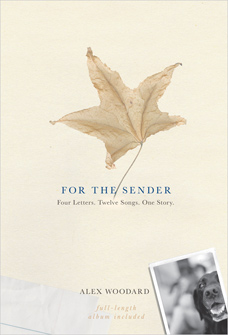Thankfully, some people still write letters
 And others turn them into music for your soul.
And others turn them into music for your soul.
A good book resonates with your heart. Good music resonates with your soul. So what happens when a talented songwriter pens a memoir? You’re taken one step closer to understanding life.
That may sound a little over the top, but the pure emotion that flows from Alex Woodard’s FOR THE SENDER can hardly be contained within its small size. The short book and accompanying CD tap into rich veins of creativity, sorrow, pride, despair, and most of all, love. Woodard’s songwriting background brings a richness to his writing that allows us the honor of feeling our way through the story of his life, reveling in his accomplishments and crying with his tragedies.
In fact, it only took me 14 pages into the book before I finally had to give in and get a box of Kleenex. Woodard’s life story and the letters of inspiration he used to write the book are both emotionally wrenching and life giving at the same time. The song lyrics he includes aren’t just poetic, they’re cathartic, helping move the reader through the sometimes-painful memories each song unearths.
Since the universe is always on our side, it’s easy for me to see why this particular book made its way to me at this time in my life. Within the first few pages, I was hooked into Woodard’s storyline, feeling my own life mirrored in his discontent of dreaming for a better life for himself. While I’m not an aspiring songwriter or musician, I think he adequately captures the denseness of living a life that isn’t quite fulfilling.
“These cold realities of the music business slowly begin to creep under my skin and some nights, as I lay alone in bed, I weave a make-believe coat of dreams as protection to keep me warm: dreams of ‘making it,’ dreams of having somebody to grow old with, dreams of little feet on hardwood floors. That imaginary coat of protection keeps the cold out, but it also keeps most of myself hidden from anybody else,” he writes.
That metaphor creeps in and out of the storyline as Woodard takes us back a few years so we can understand his own state of mind as he learns to let go of the life he thought he should be living and accept the life he has.
The storyline
FOR THE SENDER is more than Woodard’s life story. It’s a story of how he came to accept and understand his life by reframing the stories of others through songwriting. Those stories come in the form of four letters he received over a period of several years and the 12 songs that were written from each letter’s inspiration. In all, the letters and songs connect us to Woodard’s life and our own stories, which are as natural as the world can be.
The four letters Woodard received became inspiration for Woodard and some of his musician friends, pushing their creativity to capture the feelings and emotions emanating from the letters’ authors. The letters came from four women, sharing their intensely personal stories:
- Emily, who met her soulmate only to have him pass away. She began writing letters to her lost love and she included one in her letter to Woodard. The grief, despair, hope and acceptance in that letter made a profound impact on the songwriter.
- Woodard and some friends visited a homeless shelter for teens to inspire the kids and in the process became inspired by the center’s director, Kim. The story of her troubled youth and understanding of her own unique gifts is fodder for two songs.
- Alison is a medic who was one of the first responders after the devastating earthquake in Haiti. Her selfless devotion to the people of Haiti and her questioning of the will of God caused Woodard to reflect on his own faith.
- Katelyn was struggling to handle the demands of a newborn when her police officer husband was killed in the line of duty. Her resilience to move on touched Woodward and his friends as they wrote about the circle of life.
Woven throughout the storylines of each letter is Woodard’s reflection on his own life. We see his anguish over the loss of his best friend—a black Labrador named Kona—who died in his lap. His companion was a benchmark for Woodard and his dreams and her death helped clarify where his life was headed. Until he received the first letter from Emily, he had concentrated solely on writing about himself, using songwriting as a form of self-expression and emotional release.
The letters helped Woodard see life through a different filter: that of other people. He realized he could express the raw emotions of others through his songwriting and in the process, solidified his own thoughts and feelings on life and spirituality.
Woodard’s reflection on the letters and his own struggles with life help him understand the shared experiences of everyone on Earth. He understands that the letters are written more for the sender’s benefit than for the receiver. Yet the ideas, emotions, hopes and dreams of the letters are so universal that they can be appreciated by anyone.
Reading FOR THE SENDER, I felt privileged to peek into the creative process of Woodard and his friends. Like alchemists, the songwriters sifted through the words of each letter and distilled the bare essence of the sender’s souls. What remains is pure, clear insight into the human condition and a soothing tonic for understanding the world in a new way.
From a self-development perspective, I enjoyed watching Woodard’s growth through the songwriting process and ultimately his own changing consciousness. His understanding of conscious creation comes through as he breaks down his own self-defeating thought processes and begins to understand his role in creating his life.
“Under my breath I tell myself to stay out of the way and trust the process. Lately I’m finding that sometimes what I want isn’t really what I need and the right things seem to happen if I’m patient,” he writes as he begins to see the letters and subsequent songs take on a life of their own.
Ultimately, he realizes that life is best experienced when he drops expectations, when he stops trying to control every detail of his life. That’s a hard concept to process, let alone experience, but he gets there one day while surfing in the Pacific.
“These moments are what my dreams are made of now, more so than all the things I thought I wanted someday. Surfing isn’t about someday. It’s about now. I let go of someday every time I take off on a wave and become more present in the moment. Life is better then, when I’m not thinking about me.”
Who should read this book?
You don’t need to be interested in music or in self-development to find enjoyment in FOR THE SENDER. However, anyone with an interest in songwriting, creativity, spirituality or new age concepts will be pleasantly surprised by the storyline of this memoir and especially in the lingering buzz it leaves on the reader.
FOR THE SENDER does tug on the heartstrings in a most blatant manner. I attribute this to Woodard’s poetic writing style that eliminates extraneous details in order to focus on the things that matter most to him and the women who penned the letters that inspired his songs. It’s a quick and easy read but is one that is sure to stir your own deep emotions and leave you feeling hopeful for the future.
Details
FOR THE SENDER is scheduled for hardcover release on September 18, 2012. A CD of the songs inspired by the letters is included and proceeds generated by the songs from each letter will be donated to a cause of the sender’s choice.
You can watch videos of the songs created from the letters, as well as read the letters themselves, at the book’s website at: http://www.forthesender.com/
FTC Disclosure notice
I received this advanced copy of the book for free from Hay House Publishing for review. The opinion in this review is unbiased and reflects my honest judgment of the product.
Press written by Honor Your Spirit
Available through


